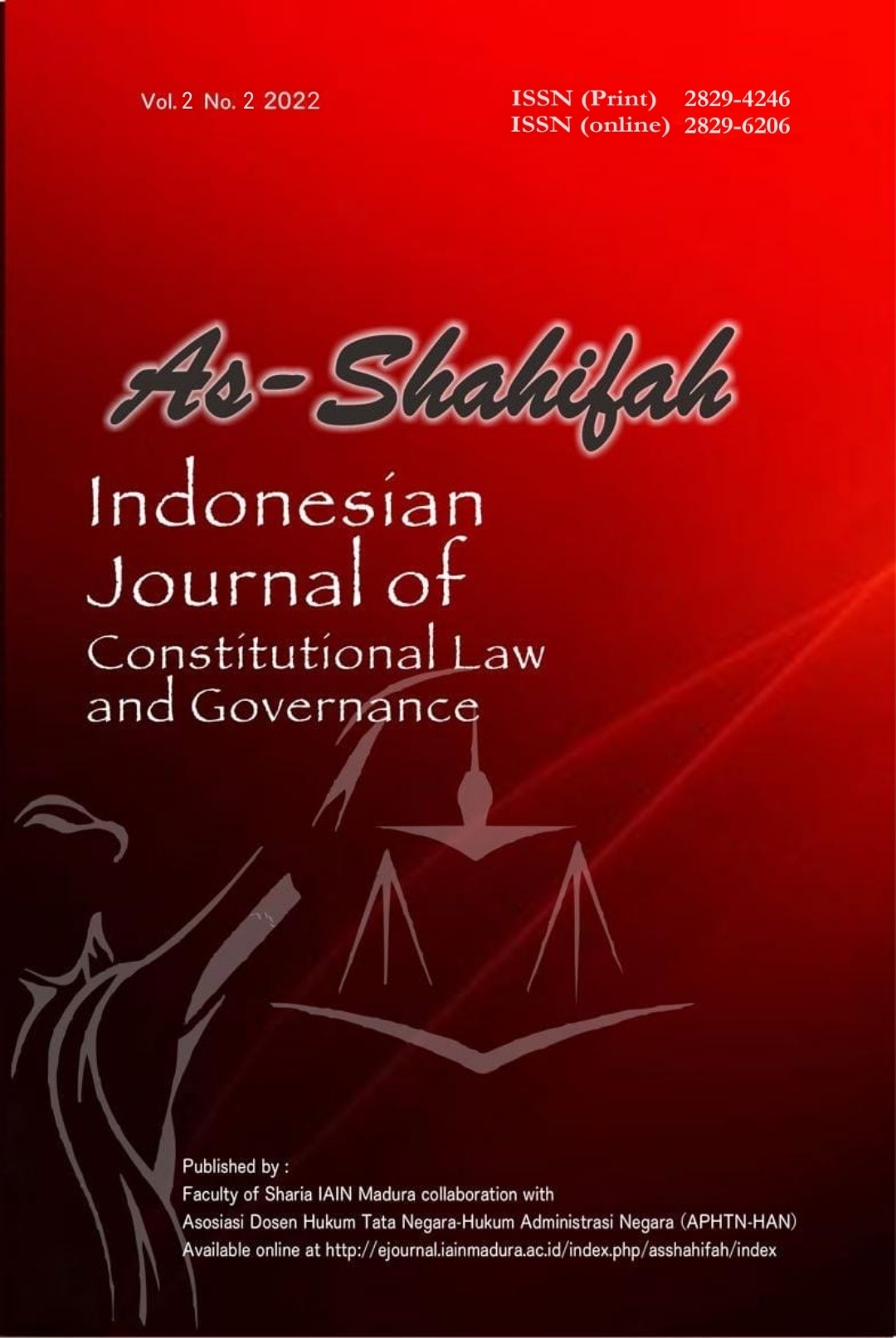Mekanisme Pemakzulan Presiden Sebelum Dan Sesudah Terbentuknya Mahkamah Konstitusi Di Indonesia
 Abstract views: 767
,
Abstract views: 767
,
 PDF downloads: 373
PDF downloads: 373
Abstract
Indonesia is a republic in which the presence of a president is very crucial. From nomination until he takes office, a President must have characteristics and actions that reflect the contents of the law. If a President during his tenure is proven to have violated the provisions of the law, then the President can be impeached in various ways that have been regulated in the law. In the history of the Indonesian state administration, there have been impeachment of the President which was carried out without proof through the Constitutional Court. Because at that time the Constitutional Court had not yet been formed. Impeachment carried out on the basis of political judgment alone. In contrast, after the Constitutional Court was formed, the indictment against the President must first be proven in the Constitutional Court. This research is normative legal research, using a statute approach and a historical approach. The research sources come from primary legal materials consisting of the 1945 Constitution of the Republic of Indonesia and Law no. 24 of 2003 concerning the Constitutional Court. Secondary legal materials consist of books, journals, articles related to the research theme. The results showed that there were differences in the ratio legis used in impeaching the President before and after the establishment of the Constitutional Court. Before the Constitutional Court was formed, the legislative ratio used was based on Article 4 of the Decree of the MPR RI No. III/MPR/1978. Meanwhile, after the Constitutional Court was formed, the ratio legis used was Article 7A of the 1945 Constitution. The mechanism for impeachment was different between before and after the Constitutional Court was formed. Impeachment before the Constitutional Court was formed was based solely on political judgments. However, after the Constitutional Court was formed, impeachment was not only based on political judgment factors, but had to be judicially tested by the Constitutional Court.
Downloads
References
Amiruddin & Zainal Asikin, 2004, Pengantar Metode Penelitian Hukum, Jakarta: Raja Grafindo Persada.
Asshiddiqie, Jimly, 2013, Pengantar Ilmu Hukum Tata Negara, Jakarta : Rajawali Pers.
Huda, Ni’matul, 2014, Ilmu Negara, Jakarta : Rajawali Pers.
Hufron, 2018, Pemberhentian Presiden di Indonesia Antara Teori dan Praktik, Yogyakarta : LaksBang PRESSindo.
Kementrian Pendidikan Dan Kebudayaan, 2011, Pendidikan Anti Korupsi Untuk Perguruan Tinggi, Jakarta : Kemendikbud.
Marzuki, Peter Mahmud, Penelitian Hukum, Jakarta: PRENADAMEDIA GROUP.
Mas, Marwan, 2017, Hukum Acara Mahkamah Konstitusi, Bogor : Ghalia Indonesia.
Ruba’i, Masruchin, Hukum Pidana, 2015, Malang : Media Nusa Creative.
Teguh, Harrys Pratama, 2019, Hukum dan Peradilan Konstitusi Indonesia. Yogyakarta : Pustaka Referensi.
Utama, Virdika Rizky, 2019, Menjerat Gus Dur, Jakarta : NUmedia Digital Indonesia.
Widodo, Mardi, 2014, Pendidikan Kewarganegaraan, Tuban : Arti Bumi Intaran.
Zoelva, Hamdan, 2011, Pemakzulan Presiden di Indonesia. Jakarta : Sinar Grafika.
Jurnal
Abdul Wahid, (2014), “Independensi Mahakamah Konstitusi Dalam Proses Pemakzulan Presiden dan/atau Wakil Presiden”, Jurnal Konstitusi, Volume 11, Nomor 4, Desember 2014.
Ali Marwan Hsb, (2017), “Putusan Final Mahkamah Konstitusi Dalam Hal Pemakzulan Presiden dan/atau Wakil Presiden”, Jurnal Legislasi Indonesia, Volume 14, Nomor 03, September 2017.
Edi Prabowo, (2020), “Mekanisme Pemakzulan (Impeachment) Presiden : Studi Perbandingan Negara Indonesia dan Brazil”, JIL: Journal of Indonesian Law, Volume 1, Nomor 2, Desember 2020.
Eko Noer Kristiyanto, (2013), “Pemakzulan Presiden Republik Indonesia Pasca Amandemen UUD 1945”, Jurnal Rechts Vinding, Volume 2, Nomor 3, Desember 2013.
Farid Wajdi dan Andryan, (2019), “Sifat Putusan Impeachment Mahkamah Konstitusi Terhadap Status Hukum Presiden dan/atau Wakil Presiden”, Jurnal Penelitian Hukum De Jure, Volume 20, Nomor 3, September 2019.
Herman Bastiaji Prayitno, (2018), “Pemakzulan Terhadap Presiden dan atau Wakil Presiden Ditinjau Dari Undang-Undang Dasar Negara Republik Indonesia Tahun 1945”, Volume 10, Nomor 2, Oktober 2018.
I Gusti Ngurah Santika, (2019), “Presidensialisme dan Problematika Mekanisme Impeachment Presiden dan/atau Wakil Presiden Berdasarkan UUD 1945 Pasca Perubahan (Perspektif Pergulatan Hukum dan Politik), Jurnal Ilmiah Ilmu Sosial, Volume 5, Nomor 1, Juni 2019.
Ilham Imaman, (2017), “Mekanisme Pemakzulan (Impeachment) Presiden dan/atau Wakil Presiden oleh Majelis Permusyawaratan Rakyat Menurut Undang-Undang Dasar Negara Republik Indonesia Tahun 1945”, Jurnal Ilmiah Mahasiswa Bidang Hukum Kenegaraan, Volume 1, Nomor 1, Agustus 2017.
Laurensius Arliman S, (2018), “Pemakzulan Presiden dan Wakil Presiden di Indonesia”, Justitia Et Pax: Jurnal Hukum, Volume 34, Nomor 1, Juni 2018.
Lintje Anna Marpaung, (2015), “Analisis Yuridis Normatif Perbandingan Prosedur Pemberhentian Presiden Dalam Masa Jabatannya Antara Indonesia Dengan Amerika Serikat dan Korea Selatan”, Pranata Hukum: Jurnal Ilmu Hukum, Volume 10, Nomor 2, Juli 2015.
Lisdhani Hamdan Siregar, (2012), “Implikasi Putusan Konstitusi Dalam Pemakzulan Presiden dan/atau Wakil Presiden di Indoneisa”, Jurnal Konstitusi, Volume 9, Nomor 2, Juni 2012.
Muh. Imam Hasmar dan Kurniati, (2020), “Pemakzulan Presiden Abdurrahman Wahid Menurut Hukum Tata Negara Islam”, Volume 2, Nomor 2, Mei 2020.
Muhammad Bahrul Ulum, (2012), “Mekanisme Pemakzulan Presiden dan/atau Wakil Presiden Menurut UUD 1945 (Antara Realitas Politik dan Penegakan Konstitusi)”, Jurnal Hukum dan Konstitusi, Volume 7, Nomor 4, Agustus 2012.
Peraturan Perundang-undangan
Undang–Undang Republik Indonesia Nomor 24 Tahun 2003 Tentang Mahkamah Konstitusi.
Undang–Undang Republik Indonesia Nomor 42 Tahun 2008 Tentang Pemilihan Presiden Dan Wakil Presiden.
Undang–Undang Dasar Negara Republik Indonesia 1945.
Ketetapan MPR No. III/MPR/1978.
Undang–Undang Republik Indonesia Nomor 20 Tahun 2001 Tentang Pemberantasan Tindak Pidana Korupsi telah dirubah menjadi Undang–Undang Republik Indonesia Nomor 19 Tahun 2019 sebagai perubahan kedua atas Undang–Undang Republik Indonesia Nomor 30 Tahun 2002.
Tap MPR RI No. VII/MPR/1973.
Bab I Buku II Kitab Undang–Undang Hukum Pidana.
Internet
Dyah Ochtorina, “Penelitian Hukum” dalam https://issuu.com/dosenhukum/docs/dyah_ penelitian_hukum (diakses pada tanggal 30 Agustus 2022).
Https://glosarium.org/?s=Ratio+legis&post_type=post&=, diakses pada tanggal 30 Desember 2021.
Https://glosarium.org/?s=Ratio+legis&post_type=post&=, diakses pada tanggal 30 Desember 2021.
Https://kbbi.web.id/Presiden.html; diakses pada tanggal 22 Agustus 2022.
Publishing your paper with As-Shahifah : Journal of Constitutional Law and Governance means that the author or authors retain the copyright in the paper. As-Shahifah granted an exclusive non commercial reuse license by the author(s), but the author(s) are able to put the paper onto a website, distribute it to colleagues, give it to students, use it in your thesis etc, so long as the use is not directed at commercial advantage or toward private monetary gain. The author(s) can reuse the figures and tables and other information contained in their paper published by As-Shahifah in future papers or work without having to ask anyone for permission, provided that the figures, tables or other information that is included in the new paper or work properly references the published paper as the source of the figures, tables or other information, and the new paper or work is not direct at private monetary gain or commercial advantage.
As-Shahifah journal provides immediate open access to its content on the principle that making research freely available to the public supports a greater global exchange of knowledge. This journal is licensed under a Creative Commons Attribution-ShareAlike 4.0.This license lets others remix, tweak, and build upon your work non-commercially, and although their new works must also acknowledge & be non-commercial, they don’t have to license their derivative works on the same terms.
As-Shahifah journal Open Access articles are distributed under this Creative Commons Attribution-ShareAlike 4.0 International License (CC BY-SA). Articles can be read and shared for noncommercial purposes under the following conditions:
- BY: Attribution must be given to the original source (Attribution)
- SA: If you remix, transform, or build upon the material, you must distribute your contributions under the same license as the original.









